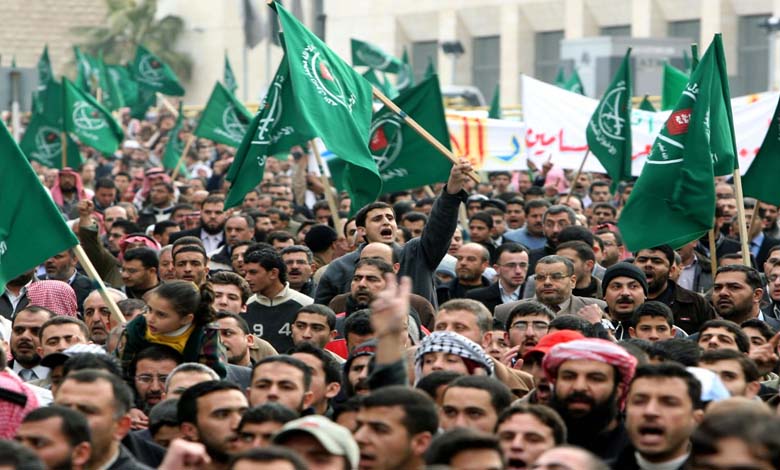Jordan’s Muslim Brotherhood… Amman closes the chapter as Washington writes the ending

A U.S. decision, following a similar Jordanian measure, has effectively delivered a fatal blow to the Muslim Brotherhood in Jordan, ending any prospects of clandestine activity and exposing its extremist nature.
Earlier this week, U.S. President Donald Trump signed an executive order initiating a process to designate the branches of the Muslim Brotherhood in Jordan, Egypt, and Lebanon as foreign terrorist organizations. This move represents a major setback for the group, following a ban imposed by Amman last spring.
These consecutive actions mark the final chapter in the long history of the Muslim Brotherhood in Jordan, dating back to the 1940s. They cut off its financial channels and reveal its terrorist dimension.
-
The Muslim Brotherhood in Jordan… From Preaching to Arms? Details of the Foiled Plot
-
Dismantling of a Terror Cell Linked to the Muslim Brotherhood in Jordan: A Strategic Opportunity to Re-highlight the Group’s Threat in the Region
Terrorism plots
These measures came after Jordanian authorities thwarted plans by the Brotherhood to undermine national security, including the manufacturing of rockets, the possession of explosives, and the arrest of 16 individuals involved.
The foiled plots involved fabricating rockets using local and imported components for illicit purposes, possessing explosive materials and firearms, hiding a ready-to-use rocket, developing drones, and recruiting and training members inside and outside the kingdom.
-
Non-Licensed Muslim Brotherhood in Jordan Completes Formation of Its Executive Office
-
7 Days Before the Parliamentary Elections… A Major Scandal for the Muslim Brotherhood in Jordan
This was not the first time the group was linked to direct terrorism. Several years ago, four deputies from the Islamic Action Front publicly praised Iraqi terrorist Abu Musab al-Zarqawi, a key al-Qaeda leader, despite 59 percent of Jordanians regarding him as a terrorist.
In November 2014, Jordanian authorities detained 31 individuals accused of belonging to a Brotherhood cell involved in smuggling weapons and funds to suspected terrorists in the West Bank, as well as establishing a secret armed wing inside Jordan.
Such actions eroded any remaining public sympathy for the group, especially in a society that values national stability as a sacred red line. King Abdullah II himself openly described the Brotherhood’s leaders as “wolves in sheep’s clothing” during an interview with The Atlantic in 2013.
-
Dismantling the Soft Arms: Jordanian Crackdown on Muslim Brotherhood Funding
-
Jordan Targets Muslim Brotherhood’s Financial Arms: Investigations, Tracing, and Legal Action
History of the Brotherhood
The Muslim Brotherhood first emerged in Jordan in the 1940s and obtained an official license as a charitable association affiliated with the Egyptian movement the following year.
In 1953, it received a second license to operate as an Islamic religious organization.
According to a diplomatic cable written by former U.S. Ambassador Edward Gnehm more than two decades ago, “the Jordanian Muslim Brotherhood was founded in 1945 as an extension of the Egyptian movement.” He noted that the king allowed the group to classify itself as a religious institution at a time when political parties were banned, enabling it to build its organizational structure while others were forced underground.
-
Slanders and Lies About Jordan… What Are the Brotherhood’s Aims?
-
Aftershocks of the Jordan Earthquake Deeply Divide Lebanon’s Muslim Brotherhood
Over the past forty years, the group has promoted its political ideology through control of professional associations, social activities, modest welfare programs, and media efforts.
A major turning point occurred in the early 1990s when the group established its political wing, the Islamic Action Front, presenting more moderate figures to broaden its appeal. However, internal divisions and the rise of Hamas in Palestine quickly deepened internal fractures.
-
The Jordanian Street Rises Against the Muslim Brotherhood… New Facts Emerge About the Terrorist Cell
-
Jordanian MPs Launch a Campaign Against the Muslim Brotherhood
Structure and influence
Today, the Islamic movement in Jordan refers to the Muslim Brotherhood and its political party, the Islamic Action Front. Each has its own leadership structure, but both are overseen by the Shura Council.
The council consists of 50 members: 33–35 elected by local branches, 12 elected by Jordanian Brotherhood members abroad, and 5 appointed as observers. All members participate in selecting the leadership.
-
The Muslim Brotherhood (International Organization) Incites Against the Jordanian State
-
The Muslim Brotherhood Loses Ground in Jordan: Security Outpaces Politics in Dismantling the Organization
For decades, the Brotherhood has exploited causes that resonate with Jordanians, such as Israeli attacks in Gaza, to rally support.
The organization also benefits from substantial financial networks. A confidential diplomatic cable from Ambassador David Hale estimated the value of Brotherhood-affiliated institutions at around 700 million dollars, providing a significant organizational base for the group and its political party.
In 2020, Jordan’s Court of Cassation officially dissolved the Muslim Brotherhood and banned its activities. Following a government decision last April, the organization was fully prohibited, and its assets were seized—closing its chapter in the kingdom.












